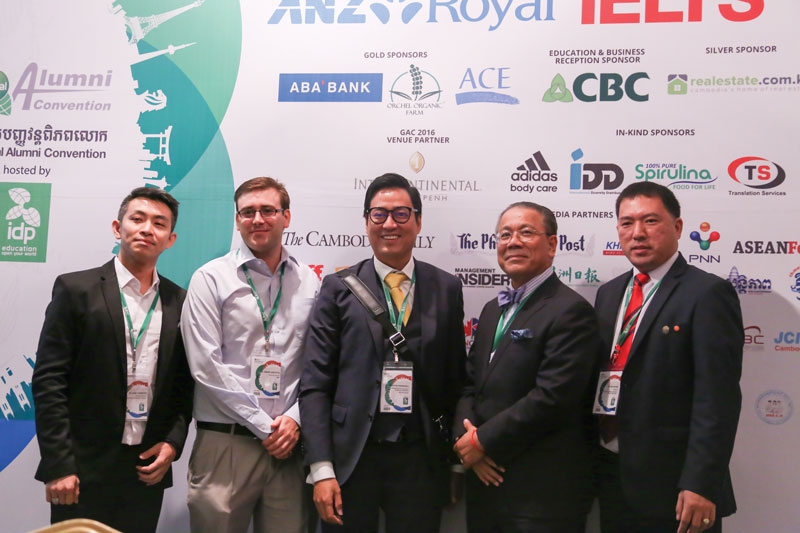Views Vary on Future of Phnom Penh at Gac
The recent announcement of the Phnom Penh Urban Master Plan provided the backdrop for a robust discussion on the future development of the capital among industry insiders at the 2nd Annual Global Alumni Convention (GAC) organised by IDP Education in January.
December 2015 saw the Cambodian government adopt a comprehensive urban master plan for Phnom Penh to ensure the sustainability of future developments within the 375-square kilometre capital until 2035. The plan released by City Hall extends the scope of an earlier blueprint which foresaw developments up until 2020 and has been integrated with the capital’s transport master plan.
Speaking at the GAC2016 panel discussion on Urban Planning and Construction: Phnom Penh in 2020 at the InterContinental Hotel., Dr. Sok Siphana, an advisor to government on the Construction Law and Managing Partner at SokSiphana&associates said he believes having a comprehensive building code to ensure buildings are built with quality and standards will support the long-term development of this city.
“We must have a good construction law to ensure a good building industry which will be also good for the economy and development, while quality buildings can also attract good investors,” he said.
He also stressed the need to regulate not only professionals like architects, engineers and designers, but also companies dealing with construction works to prevent damages from the development to any party.
The panel discussion attracted over 200 convention delegates, the most out of all the twelve panels hosted at the GAC2016 which gave a strong indication of the level of interest in the sector among Cambodians professionals. Construction & Property Magazine was a Media Partner to the convention.
Speaking from an architectural perspective, Hun Chansan, Principal Architect at Re-Edge Architecture + Design said the master plan is a first good start to provide guidelines to architects, developers and owners about what type of buildings they can build in particular zone.
“Phnom Penh can be very attractive and become the hub for businesses and leisure as well as landmark buildings if it is planned properly,” he said.
When the discussion turned to the government’s plan to eliminate flooding and introduce clear zoning in the city in the next two years, Kim Heang, CEO of Khmer Real Estate and CVEA President welcomed the initiative, but doubted whether the mechanism would be effective given that the city is built on filled in bodies of water.
On the worsening traffic congestion, Hun Chansan noted that zones such as BKK1 with diverse properties and businesses usually attract much more traffic to the area, resulting in jams. He recommended implementing a proper urban master plan to control property developments for each zone along with ensuring enough parking space along the roads. Simon Griffiths, Associate Director at CBRE Cambodia said developers must develop properties with enough parking space so that drivers won’t have to leave their vehicles on the streets anymore. In addition, the authorities should also prohibit vendors from using and blocking the capital’s pavements to encourage more people to walk.
Concerns were voiced on the panel about the potential impact on the Cambodian market from fears of an impending global economic slowdown, and in particular the effects of the contraction of the powerhouse Chinese economy.
Simon Griffiths admitted there were challenges for the long-term sustainability of Cambodian market, but was upbeat about its short and medium term prospects. Based on studies from CBRE, the demand / supply for properties were focused on the buoyant borey market, office rental space, serviced apartments and industrial developments which have showed strong performances over the last year. Griffiths predicted the biggest potential impact from an economic contraction would be on the condo market with 4,000 units being supplied to the market annually with many more coming online in the next three years.
“There is risk and potential over saturation for short-term investors especially those from overseas, but these issues aren’t serious for long-term investors,” he said.
Griffiths also projects growth will continue, driven by many pipeline developments that will be completed between now until 2019. “I also see a real appetite from developers that really want to develop something here,” he noted.
Kim Heang said it everything depends on whether Cambodia will fall into the next property bubble. While he conceded that 20,000 condo units are too many for the local market, it is not an over-supply in relation to the industry as a whole in the region, especially when it is being driven by overseas buyers. Kim Heang did counsel the audience not to overinvest in condos as first-time property purchases and instead focus on first buying a home, then seeking to buy land, and only then look into investing in condos.
The lively discussion did make clear that the government is aware of its shortcomings in the industry. According to Dr. Sok Siphana, the government is currently revising the investment law and laws on special economic zones and free trade zone which will open a larger flow for industrial property development. He predicted that Sihanoukville will become a significant multi-purpose industrial hub and that the Industrial Development Policy will also be the driver of economic growth in the next 10 years.
“This is the future of Cambodia in terms of large-scale and well-integrated industrial areas. One thing that the government is very keen on is to give lots of incentives to developers to ensure they will build proper industrial zones,” he stressed.
Dr Siphana also expects to see more Japanese and Chinese companies coming in to compete for influence in Cambodia which represent the major driving force for the Cambodian economy and welcomed the fact that US companies are increasingly coming back to invest in Cambodia.
The 3rd Annual Global Alumni Convention will be hosted in March 2017.
- Video Advertisement -



 ខ្មែរ
ខ្មែរ







